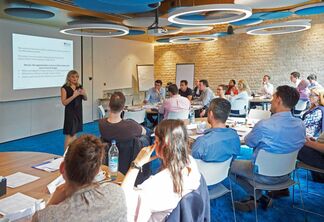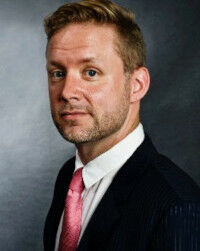Our Faculty has scientific and practical knowledge
How did this balance evolve and what are its benefits?
The history of theory and practice at Henley
Henley Business School was founded in 1945 to help rebuild the British economy and society after the Second World War. Politicians, scientists and industry representatives came together to create an institution at the intersection of theory and practice and to strategically solve a dilemma: On the one hand, the mission was to remedy the economic and social damage done during the Second World War as quickly as possible, which would be in favour of restoring previous structures. On the other hand, there was the opportunity to create something new as not much remained – but this would require significant planning time. Henley chose a pragmatic middle way that combined the newest findings from research and science with practical application to develop and implement fast, well-thought-out solutions.
Significant time has passed since the end of the war and both Great Britain and Henley have moved forward in their development. However, what remains as a part of Henley’s DNA is the combination of theory and practice and the focus on finding applicable solutions for specific economic and social issues.
On the theoretical side, this task is performed by Henley’s more than 150 faculty members, many of whom are viewed as thought leaders in their special subjects e.g. Andrew Kakabadse, Bernd Vogel and Kevin Money who are experts in areas such as entrepreneurship, responsibility, leadership and sustainability. They conduct research in their fields, regularly publish their research results in leading scientific journals and speak at conferences. Some are members of think tanks on issues as for instance Enterprise Architecture, Future of Work and Governance. However, Henley also curates knowledge from across the whole world which has been generated at other leading academic institutions so that Henley’s students can benefit from this global pool of knowledge.
Henley Faculty
This classic university role is complemented at Henley by the practical experience and orientation of the Faculty: All the experts who teach in Henley’s Executive MBA have many years of experience as managers in their field. Today, part of their job at Henley is to advise people and businesses on how to deal with current challenges.
For the students in the Henley Executive MBA, this means that they are taught by faculty members who know theory and practice from their own experience. They are interested in practice and see teaching in the Executive MBA as an opportunity to learn even more about the practice. The faculty members invite the students to contribute examples from their own experience and are not afraid to be challenged if the student’s reality does not match the theory: It is in these moments that new practice-relevant insights emerge.
The classes in the Executive MBA also serve to expand, test and adapt Henley’s knowledge base. Accordingly, the exchange between faculty members and students takes place at eye level. Everyone brings in their knowledge and experience and together, new insights emerge that help both parties.


